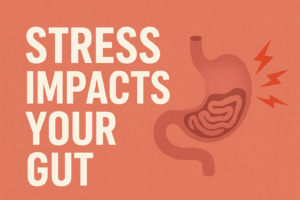
Introduction
Modern life is fast-paced and demanding. From work pressure to personal responsibilities, stress has become a part of everyday life. While most people know that stress can affect mood and energy, very few realize how much it impacts digestion. Your gut and brain are closely connected, and long-term stress can disrupt this connection, leading to problems like bloating, acidity, constipation, and irritable bowel syndrome (IBS). If you’ve been struggling with unexplained stomach issues, learning how to manage stress could be the missing piece.
This guide explains how stress affects your gut health, ways to protect your digestive system, and practical tips to stay calm and healthy. For specialized care, visiting a dr liver specialist at a trusted hospital such as sids hospital surat can help you get the right guidance for long-term digestive wellness.
The Gut-Brain Connection
Your gut is often called your “second brain.” This is because it communicates directly with your central nervous system through the gut-brain axis. When you feel stressed, your brain sends signals to the digestive system. These signals can slow down digestion or speed it up, leading to discomfort.
- Short-term stress can cause stomach pain, loss of appetite, or diarrhea.
- Long-term stress can lead to chronic problems like IBS, ulcers, acid reflux, and even changes in gut bacteria balance.
When stress hormones like cortisol rise, they affect gut movement, reduce blood flow to the digestive system, and increase acid production. Over time, this can make your gut more sensitive and reactive.
Common Digestive Problems Linked to Stress
Stress doesn’t cause all stomach issues, but it can worsen existing ones or trigger symptoms in people with sensitive digestive systems. Some of the most common conditions include:
- Acid reflux & heartburn
- Bloating and gas
- Constipation or diarrhea
- Irritable Bowel Syndrome (IBS)
- Stomach cramps or abdominal pain
- Changes in appetite
If these problems keep coming back, it’s important to get checked by a specialist rather than relying only on home remedies.
How Stress Affects Digestion
- Slows down digestion: Stress can cause your stomach to empty more slowly, leading to bloating and discomfort.
- Speeds up digestion: In some cases, it can cause diarrhea by speeding up bowel movements.
- Changes gut bacteria: Stress can reduce healthy bacteria, which play a major role in digestion and immunity.
- Increases acid production: This can lead to acid reflux and heartburn.
- Weakens gut lining: Over time, chronic stress may make your gut lining weaker and more sensitive, causing pain and inflammation.
Tips to Reduce Stress for Better Digestion
Here are practical ways to lower stress levels and support a healthier gut:
✅ 1. Practice Deep Breathing
Slow, deep breaths calm the nervous system and improve digestion. Try inhaling for 4 counts, holding for 4, and exhaling for 6. Repeat for a few minutes whenever you feel tense.
✅ 2. Eat Mindfully
Don’t rush meals. Chew food slowly and enjoy every bite. Avoid eating when you’re very anxious, as it can disrupt digestion.
✅ 3. Stay Physically Active
Regular exercise, like walking, yoga, or cycling, helps reduce stress hormones and improves gut movement.
✅ 4. Get Enough Sleep
Poor sleep increases stress levels and worsens digestive issues. Aim for 7–8 hours of restful sleep every night.
✅ 5. Avoid Overeating Junk Food
Comfort eating might feel good temporarily but can increase acidity and bloating. Choose nourishing meals instead.
✅ 6. Stay Hydrated
Drinking enough water keeps your digestive system running smoothly and reduces constipation.
✅ 7. Try Relaxation Techniques
Yoga, meditation, or listening to calming music can lower stress and help your gut function better.
✅ 8. Stay Connected
Talking to friends or loved ones when stressed can reduce anxiety levels and indirectly help your digestion.
Foods That Help Reduce Stress and Support Gut Health
- High-fiber foods: Oats, bananas, apples, and leafy greens keep the gut healthy.
- Fermented foods: Yogurt, kefir, sauerkraut, and kimchi add good bacteria to the gut.
- Omega-3 rich foods: Salmon, walnuts, and flaxseeds help reduce inflammation.
- Chamomile tea: Calms both your mind and digestive system.
- Dark chocolate (in moderation): Can help reduce stress and support gut health.
Frequently Asked Questions (FAQ)
- Can stress really cause digestive problems?
Yes. Stress affects the gut-brain connection, leading to symptoms like bloating, acidity, constipation, or diarrhea. - Will managing stress completely cure my stomach issues?
It can significantly improve symptoms, but if you have an underlying condition like ulcers or IBS, medical treatment may still be needed. - What foods should I avoid when stressed?
Limit spicy foods, caffeine, alcohol, and processed snacks. These can trigger acid reflux and upset digestion. - Can exercise help reduce stress-related stomach pain?
Yes. Physical activity lowers stress hormones and improves gut movement, helping reduce pain and discomfort. - When should I see a doctor?
If you experience severe abdominal pain, unexplained weight loss, persistent acidity, or changes in bowel habits, consult a digestive health specialist.
